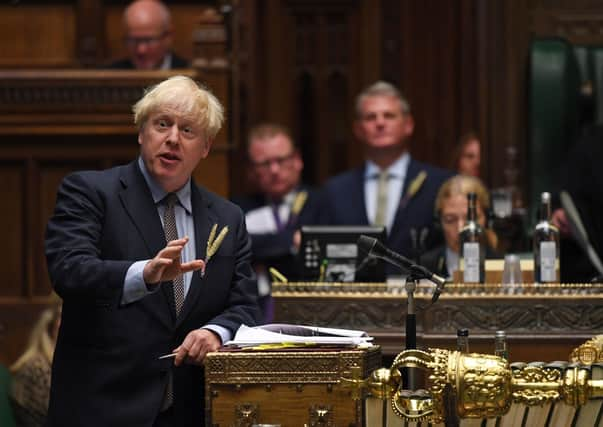Nicola Sturgeon brands Boris Johnson’s Brexit internal market proposals an ‘abomination’, with Scottish Government not ruling out a legal challenge


The First Minister warned that the UK’s government’s Internal Market Bill published yesterday will drive Scots to vote for independence as she ramped up the pressure for a second referendum.
The Scottish Government has not ruled out a legal challenge over the proposals. Former Tory prime minister Sir John Major joined criticism of the Bill, which ministers have acknowledged will breach international law.


Advertisement
Hide AdAdvertisement
Hide AdBut the concerns have been played by down by Scottish Secretary Alister Jack, who said the changes will provide a “safety net” for UK businesses when the jurisdiction of the EU single market ends in the UK next year.
Writing in The Scotsman today, Mr Jack insists the “overwhelming majority” of firms are behind the measures. Prime Minister Boris Johnson has also said that the legislation will provide a tranche of new powers for Holyrood.
In a strongly-worded attack after the legislation was published yesterday, Ms Sturgeon said: “The Tories’ proposed bill for a so-called UK internal Market is an abomination. It is a naked power grab which would cripple devolution.
“The plan for mutual recognition of standards in reality means a race to the bottom when it comes to things like food standards and environmental protections.
“It would prevent the Scottish Parliament from effectively legislating in a whole range of areas, including laws covering the food people put on their tables, which is currently produced to high EU animal welfare and food safety standards.
“That could be undermined by Scotland having to accept lower standards set by a UK government in pursuit of a US or other trade deals – and could see us forced to accept chlorinated chicken.”
Fears of new barriers
The bill aims to guarantee companies can trade unhindered in every part of the UK and replaces the provisions of the EU single market when the Brexit transition period ceases at the end of the year.
Brexit will see Holyrood and the other devolved nations handed new controls over areas such as animal welfare, food regulations and the environment. But there are fears that this may lead to new barriers to trade between different parts of the UK, prompting the need for “single market” rules.
Advertisement
Hide AdAdvertisement
Hide AdThe bill will come before the Scottish Parliament for legislative consent as it cuts across devolved areas, but this is likely to be rejected by MSPs. However, the UK government can press ahead without this.
Ms Sturgeon has pledged to “fiercely resist” the plans and called on all parties in Scotland to oppose the measures contained in the bill.
“All parties – including the Scottish Tories – have a duty now to protect and defend the powers democratically endorsed by the people of Scotland. Far from returning powers to Scotland, as promised by the likes of Michael Gove, it is now crystal clear that Brexit means taking back control from Holyrood and taking control away from the Scottish people. That is a betrayal not just of devolution, but of the promises made in the Brexit referendum, including those in Scotland who voted Leave.
“It is also now clearer than ever that the only way to defend the powers of the Scottish Parliament is with independence. And when an independence referendum comes – as it will – it will no longer be a choice between independence and the status quo, but between independence and a Tory regime which is intent on crippling Holyrood.”
But Mr Jack insists that the legislation will preserve the integrity of seamless trade across the UK when it comes into effect. “The bill will also create a safety net giving businesses the certainty they need after EU-wide rules cease to apply,” he writes. “We will guarantee that, where Common Frameworks do not exist, regulations from one part of the UK will be recognised across the whole country.
“That means Scotland’s distillers would be assured of access to barley grown in other parts of the UK and oatcakes baked in West Lothian will continue to appear on supermarket shelves in the West Midlands.”
Mr Johnson pledged to press on with the bill as he faced criticism from SNP Westminster leader Ian Blackford in the Commons yesterday.
“I believe that his attacks on it are totally illogical, it actually represents a very substantial transfer of powers, of sovereignty to Scotland, to Wales... it is a massive devolutionary act,” Mr Johnson said.
Advertisement
Hide AdAdvertisement
Hide Ad“It also ensures the integrity of the UK internal market and he speaks of a transfer of powers to the UK government, on the contrary what he would do is transfer powers not just over competition and state aids back to Brussels, but of course over fisheries too and that is the policy of the SNP and it would be a disaster for our country.”
Backlash from Tory ranks
The Prime Minister has faced a backlash from within Tory ranks after Northern Ireland Secretary Brandon Lewis said on Tuesday that legislation to change the Withdrawal Agreement would go against international law in a “very specific and limited way”.
Ministers have argued the measures are necessary to ensure “damaging” tariffs are not imposed by “default” on goods travelling from the rest of the UK to Northern Ireland if negotiations with the EU on a free trade agreement fail.
But senior Conservatives have expressed dismay, warning the move risks undermining Britain’s standing and reputation as an upholder of international law.
Tobias Ellwood, chairman of the Commons defence committee, said if the government went through with the changes to the agreement – which secured the UK’s departure from the EU in January – it would “lose the moral high ground”.
“This is about the rule of law and our resolve and commitment to uphold it,” he told the BBC Radio 4 Today programme. To unilaterally ignore any treaty in its obligations which we’ve signed and submitted to the United Nations would actually go against everything we believe in.”
Comments
Want to join the conversation? Please or to comment on this article.